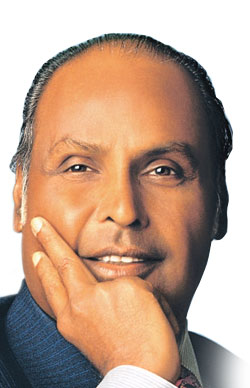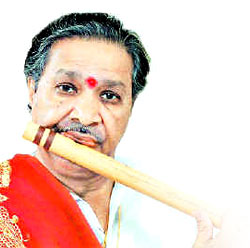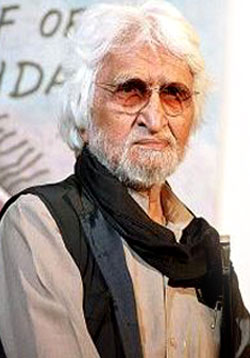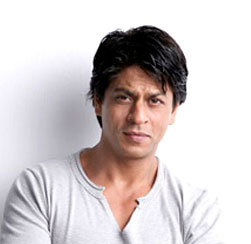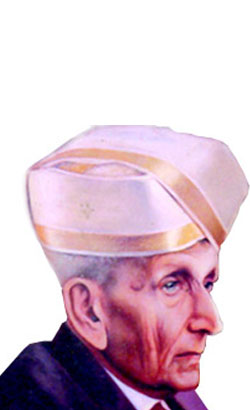Abdul Ghaffar KhanHe was known as the 'Frontier Gandhi'. He was a nationalist Muslim leader of the North-West Frontier Province. He first started a militant organisation known as the 'Red Shirt', and later on joined the non-violent Civil Disobedience Movement started by Mahatma Gandhi.
Acharya Vinoba BhaveSaintly personality; had devoted his life to social welfare; founder of the Bhoodan movement.
Amir KhusrauAssumed 'Parrot of India', was a famous poet and author who wrote in poetry and prose and also composed music. He enjoyed the patronage of successive Sultans of Delhi from Balban to Ghiyas-ud-din Tughluq. He died in 1324-25. His works include Tughluqnamah and the Tarikh-i-Alai.
Anand Mohan BoseHe was a prominent Indian public man in his times. He was the first Indian to be a Wrangler of Cambridge University in 1873. He was the founder-secretary of the Indian Association which was established in Calcutta in 1876, and presided over the 14th session of the Indian National Congress held in Ma
Ashutosh MukherjeeHe was an eminent lawyer and educationist. He was certainly a maker of modern Bengal, if not of India, by virtue of his eminent services to the cause of education. At the early age of 25 he became a member of the Senate of the Calcutta University of which he became the vice-chancellor.
Aurobindo GhoshAn ardent nationalist who later became a saint, was educated in England. His views were readily accepted by Lala Lajpat Rai of Punjab and Bal Gangadhar Tilak of Maharashtra and led to the formation of an extremist school within the Congress.
Bal Gangadhar TilakPatriot and statesman, known as Lokmanya. He organised Extremist Party within the Congress with Lala Lajpat Rai and Bipin Chandra Pai. Britishers called him "Father of Indian Unrest". He gave the clarion call "Swaraj is my birth right". Tilak was the founder-editor of Mahratta (English) and Kesar
Bhagat SinghKnown as Shahid-e-Azam. Founded Naujawan Bharat Sabha. Exploded bomb in Central Legislative Assembly at Lahore on April 8, 1929. He was arrested and sentenced for life. He along with Sukh Dev and Shivram Rajguru, was hanged on March 23, 1931 for participating in Lahore conspiracy.
Chakravarti RajagopalachariA prominent Indian politician, born in South India in 1879. He was the General Secretary of the Indian National Congress in 1921-22 and was a member of the Congress Working Commitee. Rajagopalachari was the Chief Minister of Madras from 1937-39.
Dadabhai Naoro JiHe was elected president of the Indian National Congress at its second session held in Calcutta in 1886. He was the first Indian to be elected a member of the House of Commons in England on a ticket of Liberal Party. Twice again, in 1893 and in 1906, he was elected president of the INC.
Dr. B. R. AmbedkarA prominent leader of the Scheduled Castes. Built up a party of the untouchables, became a member of the Constitutent Assembly and piloted through it the Indian Constitution Act which declared India to be Republic. He also piloted the Hindu Code through the Indian Legislature.
Dr. Rajendra PrasadHe was the first President of the Republic of India. Born in Bihar in 1884, educated at the Calcutta Universty, he began his career as an advocate and soon commanded a very large practice at Patna High Court. Prasad became the president of Congress in 1934, 1939 and 1947; a minister in Nehru's cabin
Gopal Krishna GokhaleHe was a prominent Indian nationalist, and presided over the 1905 session of the Indian National Congress. In 1905 he founded at Poona the Servants of India Society. He died in 1915. He is considered as the 'Political Guru' of Gandhiji.
Govinda Ballabh PantThe celebrated Sanskrit grammarian, was the author of Ashtadhyayi. He was one of the leading members and leaders of the Indian National Congress. He became the Chief Minister in his native province of Uttar Pradesh after independence.
Ishwar Chandra VidyasagarSocial reformer and educationist from Bengal and a pioneer in the field of primary education and widow re-marriage.
Jamshedji TataParsi industrialist and philanthropist. Father of Indian industry, founded Tata, Iron and Steel Company in Bihar.
Lal Bahadur ShastriPrime Minister of India from May, 1964 to his death on 11 January, 1966. He was conferred Bharat Ratna posthumously. He was a martyr for the cause of peace between India and Pakistan at Tashkent.
Lala Lajpat RaiIndian national leader known as "Lion of Punjab". Founder editor of Bande Mataram, The Punjabeeand The People. Died of injuries caused by police lathi-charge while leading a demonstration against Simon Commission at Lahore in 1928. Author of Young India, The Arya Samaj and England's Debt to India.
Mohandas Karamchand GandhiBetter known as Mahatma Gandhi, was born on October 2, 1869 at Porbandar in Gujarat. Became a barrister-at-law (1891) in England. Went to South Africa in 1893. Stayed there till 1914 for the cause of the emancipation of the Indians from the insulting life.
Mrs. Vijayalakshmi PanditBorn in 1900, was a talented daughter of Pandit Motilal Nehru. She held many high offices after Indian independence including the post of India's High Commissioner in England (1955-61) and India's Ambassador to the U. S. S. R. as well as to the U. S. A.

Mrs. Annie Besant
English theosophist, bom in London in October 1847. She founded the Central Hindu College at Banaras and was elected president of the Theosophical Society in 1907. In 1916 she founded the Indian Home Rule League and became its first president and in 1917.

Mrs. Sarojini Naldu
The most talented Indian lady, born of Bengali parents, was a poet and orator who took a prominent part in Indian politics. She presided over the Kanpur session of the Indian National Congress in 1925 and was the first lady to be appointed a state Governor in the Republic of India.

Netaji Subhash Bose
Popularly known as Netaji, was born on January 23, 1879, at Cuttack. He passed the Indian Civil Service Examination in 1920. He joined the Indian National Congress in 1921. In 1938 he was the president of the INC at its Haripura session and in 1939 he was elected president of its Tripuri session.

Pandit Jawahar Lal Nehru
He was the first Prime Minister of Independent India and is known as the architect of modem India. He was born in Allahabad on Novemeber 14,1889. In 1928 be became the General Secretary of the Indian National Congress and in 1929 its President. At the Lahore session under his Presidentship was pass

Pandit Madan Mohan Malviya
A leading nationalist leader, prominent educationist and social reformer. Later on joined the second session of the Indian National Congress held in 1886 and twice became its President in 1909 and 1918. His greatest achievement was the foundation in 1915 in Benaras of the Hindu University.

Pandit Motilal Nehru
A renowned Indian patriot, was born on 6th May, 1861 in Delhi. He began his career as a lawyer at the Allahabad High Court, joined the Indian National Movement and started a journal named The Independent' to support the cause of Indian Nationalism. Along with C. R. Das he formed the Swarajist Party

Rabindranath Tagore
Poet, novelist, patriot, educationist, essayist, painter and philosopher. He founded Shantiniketan (now Viswabharati University) in West Bengal. The first Asian to receive Nobel Prize in Literature (for Gitanjati in 1913), writer of National Anthems of India and Bangladesh.

Ram Manohar Lohla
A social and political revolutionary, he founded the'Samajwadi Party' after difference of opinion with the Congress.

Ramakrishna Paramhansa
He was a very great spiritual teacher of the Hindus in modern times. His two-noteworthy disciples were Keshavchandra Sen and Swami Vivekanand.

Rasbehari Basu
He was elected president of the Surat session of the Indian National Congress in 1907 in which the Moderates and Extremists came to a serious clash. Next year he presided over the Madras session of the INC.

Sardar Vallabhbhai Patel
A renowned Indian patriot and politician, was born on the 31st, October, 1875 in Gujarat and began his career as a lawyer. He took a leading part in the Bardoli Satyagraha movement. In 1931 he became the president of the Congress. He joined the "interim Government" set up in 1946 as the Home Ministe

Sarvapalli Radha Krishan
The second President of the Republic of India. Radha Krishnan was appointed as India's ambassador to the USSR in 1949. In 1962 he became the President of India. His birthday, Sept 5, is celebrated as Teacher's Day.'

Shaukat Ali
A prominent leader and politician amongst the Indian Muhammadans. He along with his brother Muhammad All, led the Khilafat Movement in 1919-20. He also joined the Indian National Congress and the non-co-operation movement.

Sir Sayyid Ahmed Khan
He was a prominent leader of the Indian Muhammadans. Remained loyal to the British during the Sepoy Mutiny (1857-58), founded the Muhammadan Anglo-Oriental College at Aligarh in 1875. In 1920 the college was raised to the status of University and called the Aligarh Muslim University.

Sister Nivedita
A famous disciple of Swami Vivekananda, was an Irish lady named Miss Margaret Nobel.

Swami Vivekananda
Disciple of Rama Krishna Paramahansa, and founder of Ramakrishna Mission at Belur. He championed the supremacy of Vedantic philosophy and his talk at the Chicago conference of world religions in 1893 made westerners realise the greatness of Hinduism for the first time.

V. D. C Savarkar
He founded Mitra Mandal aimed at achieving freedom by armed rebellion, founded Abhinav Bharat, started Free Indian Society in England (London). Savarkar was arrested in Nasik conspiracy case and sentenced to transportation for life and freed in 1937. He authored Indian War of Independence.

Wumesh Chandra Banerjee
The first president of the Indian National Congress held at Bombay in 1885. He was made Congress President a second time at its Allahabad session in 1892.

Zakir Hussain
Proposed Wardha Scheme of education, formerly Vice-Chancellor of Jamia Millia. He was elected as President of India in 1967.




















